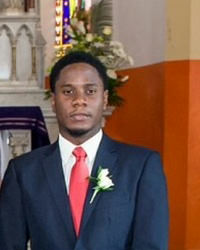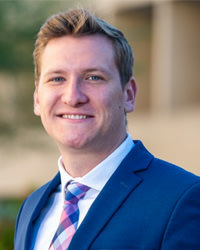Cassandra Alexandre '18
I started my college career at SUNY Oneonta during the Fall of 2014 as an International Development Studies major. I had considerable interest in global studies, particularly the forward progress of the global south. My first semester courses included Introduction to Microeconomics (taught by the late, great Professor Ring). I quickly learned a simple fact: It is impossible to separate development from economics. Economics became a tool to better grasp every “why?” raised during my studies. At its core, it is an advantageous foundation of understanding. By Spring 2015, I had added Economics as my second major.
In addition to my intrigue in the subject, SUNY Oneonta’s Economics Department is filled with educational leaders devoted to student success. They have established and continue to encourage a positive culture that is ripe for learning. Just as I was, Economics majors (and minors) will be challenged to apply critical thinking and analysis to resource allocation, economic theory, international trade, historical trends, economic development, mathematical methods and economic systems.
My education is the bedrock of my career. No regrets!
Thanh Nguyen '18
As a SUNY Oneonta graduate with a dual major in Economics and Philosophy, I've leveraged the analytical and reasoning skills I developed during my studies to build a successful career in public health. The training I received from the Economics department has been vital in my roles in direct care, pandemic response, and data governance, where I apply data-driven approaches to secure health equity.
My experience as an immigrant navigating the American healthcare system fueled my commitment to addressing health disparities, particularly among non-English-speaking communities. These early challenges ignited my passion for social justice and public health, driving me to make a difference.
At SUNY Oneonta, I chose to study Economics and Philosophy to gain both the technical expertise required to analyze complex public health issues and the critical thinking and communication skills essential for advocating on behalf of marginalized communities. My Economics studies, in particular, equipped me with the analytical tools necessary for data-driven decision-making, a skill that has been invaluable throughout my career. The research and statistical analysis techniques I honed as an Economics major have contributed to my ability to assess and address public health challenges effectively.
One of the most transformative experiences of my academic journey was the senior seminar, where I conducted original research on the impact of the Affordable Care Act on cancer screening among low-income individuals. Defending this work before a panel of faculty members was both daunting and rewarding. It required me to blend systematic Economics analyses with Philosophical considerations, a skill that has shaped my approach to public health. This experience underscored the value of preparation, resilience, and the importance of effectively communicating complex ideas to diverse audiences.
After graduation, I began my career in direct care within human services, where I supervised a harm reduction program for urban youth, providing STI testing, counseling, and substance use education. I worked directly with individuals and communities, supporting those living with chronic illnesses and helping them navigate their health challenges. As an Emergency Preparedness Coordinator during the COVID-19 pandemic, I led efforts to coordinate mass vaccination sites, collaborating closely with community pharmacies, EMS providers, and local law enforcement to ensure that vaccines reached vulnerable populations, including homebound residents. I worked with over 900 Medical Reserve Corps volunteers, overseeing the logistics of more than 100 mass clinics and vaccinating over 100,000 people.
Currently, I serve as the SPARCS Data Governance Manager at the New York State Department of Health. In this role, I oversee data release operations, ensure compliance with regulatory standards, and lead a team dedicated to maintaining the integrity and confidentiality of critical healthcare data. My Economics background has been crucial in this position, allowing me to analyze complex datasets, assess research proposals, and implement data-driven strategies that enhance operational efficiency. The skills I developed in economic research and statistical analysis enable me to evaluate the impact of data governance decisions on public health outcomes, ensuring that our work not only meets requirements but also contributes to improving health equity for underserved communities.
Driven by a strong desire to make a meaningful impact, I approach every aspect of my work—from data governance to direct care and my ongoing studies in public health—with a commitment to creating a more equitable healthcare system. My ultimate goal is to use the skills I've gained, both academically and professionally, to break down barriers to care and ensure that everyone, especially those facing the greatest challenges, has access to the healthcare they need.
Akanni Seale '20
I arrived at SUNY Oneonta in Fall 2017, deciding to major in Economics, and graduated in Fall 2020. Since the age of 16, I already imagined myself to be involved in the business industry. As an avid follower of soccer, my dream has always been to combine sports and business. Thankfully, due to my experience at SUNY Oneonta with the Economics department, I have been blessed to have a career that I had imagined at a young age. Most notably, I worked at KPMG as an analyst in the Advisory department and am currently at Bank of America as a Tax Operations Associate. My ultimate career goal is to have a marriage between economics and soccer as a business consultant at an elite soccer organization in the United States or the United Kingdom.
SUNY Oneonta was always the perfect location for me to complete my undergraduate studies. The location was unique in that although it was a few miles from NYC, there was an authenticate college feel throughout the Oneonta community. It was also not too noisy, so that I could focus academically. Additionally, I knew I would have had a successful experience with the economics department after having several conversations with my admissions counselor.
Growing up in Trinidad and Tobago, a strong academic performance in accounting, business management, and mathematics meant you were destined to major in accounting or finance. However, while interning at the Central Bank of Trinidad and Tobago in the summer of 2016, I realized I desired a career that welcomed curiosity and diversity, encouraging me to push the boundaries of critical thinking while delving into investigating the unknown. As a result, when I arrived at SUNY Oneonta, I knew that I wanted to major in Economics as it included all of the above.
By far, my favorite experience studying economics at SUNY Oneonta was the senior seminar course. It allowed me to really put into practice the theories and economic principles that I would have learned through the various great courses available. Not only was I able to use these theories and apply them to research real-world issues, but I was also blessed to be in an incredible class where I learned a lot from the research put forward by my fellow classmates and professors. These experiences allowed me to properly craft my research paper, where I analyzed the effects of mental illnesses on labor outcomes. For me to really make my vision a reality with this research paper, I must thank Dr. Kitissou, who mentored me during this process and challenged me to do extensive research so that my results and findings would be credible.
The economics department specifically is blessed with some of the best professors on campus. Having said that, Dr. Kitissou and Dr. Sirianni are two of the people who were particularly influential during my time at Oneonta. They possess great knowledge of all economic theory required, and they are both skilled in the manner that they break down these theories so that said theories are easily digestible to their students.
Having said that, I would like to give special thanks to SUNY Oneonta and the Economics department for allowing me to be inducted into Omicron Delta Epsilon, also known as the New York chapter of the International Honor Society in Economics.
Karlo Vlahek '20
The economics discipline pulled me in due to its presence in every industry. I wanted to settle for something other than a major that would limit my opportunities in the job market, but I wanted a major that was in demand. At SUNY Oneonta, I took courses in Natural Resource Economics, Health Economics, Banking, and the broader applications of Microeconomic theory, which focus on how businesses and consumers make decisions at their core. The economics major exposes you to a breadth of industries as you acquire a lucrative and timeless skillset on the fundamentals of human behavior.
My passion for economics started before I enrolled at SUNY Oneonta. I took several courses in high school to gain exposure to various disciplines, including Architectural Design, Forensic Science, and even Radio Broadcasting. It was in my senior year that I stumbled upon economics. Economics isn't just the study of people and their decisions and how those decisions affect the world around us.
As I progressed through my economics major at Oneonta, I realized how valuable and prevalent quantitative foundations can be. The economics major equips you with a unique skill set by teaching you how to understand human behavior in a numeric context. This understanding allows you to position yourself in a career where you know both the qualitative aspects of human behavior and can support it quantitatively. Enrolling in courses such as econometrics and the Fed Challenge bridges the gap between technical and non-technical understanding of the world around you. In the econometrics course, you dive into the statistical frameworks used by economists for centuries, such as regression analysis. Government agencies, tech firms, and all companies that wish to derive insightful information from their data use this framework. You learn about statistical building blocks, how to answer questions about the world using analytics, and train your mind to approach any problem with a quantitative base. The Fed Challenge yields similar benefits, except this focuses more on making deductions and presenting meaningful data and trends to stakeholders (in this case, PhD economists at the Federal Reserve!). These courses prepare you well for the capstone course, where you are tasked with producing original research, and a faculty member of your choice supports you. The capstone course is an all-encompassing opportunity, leveraging your coursework, knowledge, and passions to provide meaningful insight into an economic question (spoiler: due to economics' applications, these questions are endless). When considered at an aggregate level, the former and the latter capstone courses equip you with a solid foundation to land jobs in analytics, marketing, product, consulting, government, and any career that values applying a quantitative approach to human behavior.
Since graduating from SUNY Oneonta, I completed a master's in economics at the University of Texas at Austin. I peeled back more layers of Economics and realized even more extensive opportunities the discipline provides. Math and statistics are the focus at the graduate level, but your skills and their applications expand. I was able to enroll in data science and machine learning courses that expanded my understanding of the world and equipped me with the ability to pose my questions and explore the unknown at a surprisingly granular level. Since I graduated from Oneonta, I have taken several positions in consulting for startups, nonprofits, and law firms. All three types of experiences are seemingly unrelated. I assure you that they very much are. That is the power of a degree in economics.


